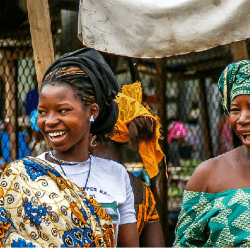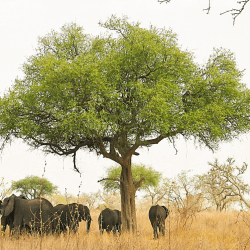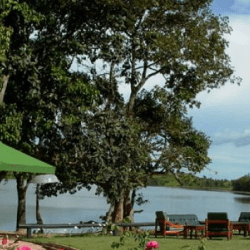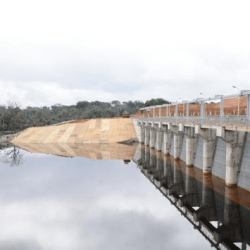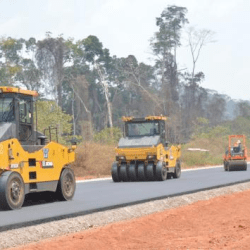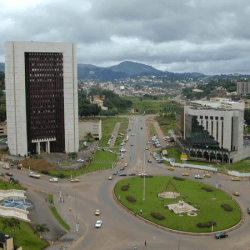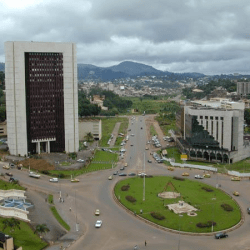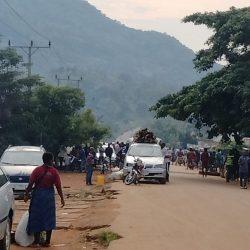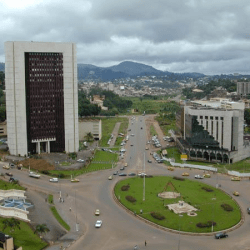Who Are the Baka People?
The Baka people are an indigenous hunter-gatherer community residing in the dense rainforests of South-Eastern Cameroon and parts of the Central African Republic, Gabon, and the Republic of Congo. They number around 40,000 and are one of the last remaining forest-dependent societies in Africa. Unlike other neighboring groups who have adopted farming and livestock rearing, the Baka maintain a strong connection to the forest, relying on traditional knowledge for their survival.
The Village of Bemba – A Small but Resilient Community
Located in the south-eastern part of Cameroon, Bemba is a small village with a population of around 70 people. The village remains largely isolated, with its residents living in close-knit family units. The Baka’s nomadic nature means that settlements like Bemba often serve as semi-permanent bases, shifting as needed based on hunting and foraging conditions.
The Hunter-Gatherer Lifestyle of the Baka
The Baka are expert hunters and gatherers, using traditional bows, spears, and traps to hunt small game such as duikers, monkeys, and wild pigs. They also collect honey, wild yams, nuts, and medicinal plants, demonstrating an intricate knowledge of the forest ecosystem. Their sustainable hunting practices ensure that they do not overexploit the environment.
Cultural Traditions and Spiritual Beliefs
The Baka have a rich oral tradition filled with storytelling, music, and dance. Their spiritual beliefs revolve around the forest and its spirits, which they honor through rituals and ceremonies. The famous “yeli” songs—harmonic yodeling—are used to communicate with the spirits and to coordinate group activities.
Daily Life in Bemba Between 2019 and 2021
Between 2019 and 2021, the village of Bemba continued its traditional way of life but also faced increasing pressures from external influences. Despite these challenges, the community upheld its daily routines of hunting, gathering, and participating in social and spiritual events.
Challenges Faced by the Baka People
- Deforestation – Logging and agricultural expansion threaten their habitat.
- Land Rights Issues – The Baka have limited legal recognition over their ancestral lands.
- Marginalization – They often face discrimination and limited access to education and healthcare.
- Encroaching Modernization – Increased contact with outsiders brings both opportunities and cultural erosion.
Conservation Efforts and the Future of the Baka
Organizations and conservationists are working to preserve the Baka way of life by promoting land rights, environmental protection, and cultural preservation programs. Sustainable ecotourism initiatives and legal advocacy efforts are essential in ensuring their continued survival.
Why the Baka Culture Matters in Today’s World
The Baka people’s deep knowledge of the rainforest holds crucial insights into biodiversity conservation, herbal medicine, and sustainable living. Recognizing and protecting their culture helps not only the Baka but also the broader global efforts to combat climate change and preserve indigenous wisdom.

1. How do the Baka hunt and gather food?
The Baka use traditional hunting techniques such as bows, spears, and traps. They also gather wild fruits, honey, and medicinal plants.
2. What language do the Baka speak?
They primarily speak Baka, a Bantu-related language, but many also understand French or other regional languages.
3. How is the Baka community structured?
The Baka live in small, close-knit groups, often led by elders who guide decision-making and conflict resolution.
4. What threats do the Baka face today?
The biggest threats include deforestation, land disputes, marginalization, and the impact of modernization on their traditional way of life.
5. How can people help protect the Baka culture?
Supporting indigenous rights organizations, conservation efforts, and sustainable ecotourism can help safeguard the Baka’s way of life.
6. Why are the Baka called “pygmies”?
The term “pygmy” is often used to describe short-statured forest-dwelling groups in Africa, but many consider it an outdated term. “Baka” is the preferred name.

